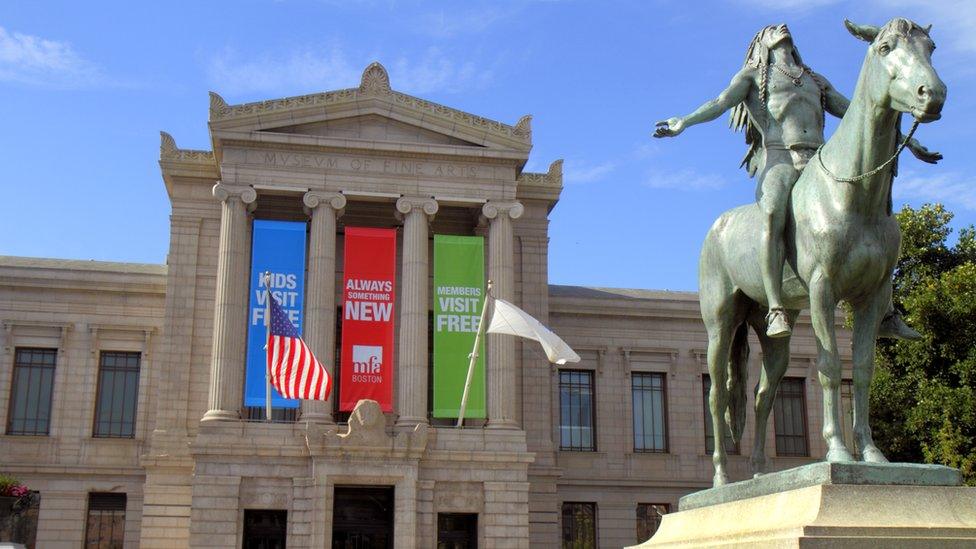Boston museum accused of racist 'no watermelons' remark
- Published

The Museum of Fine Arts has apologised for the "challenging and unacceptable experiences"
The Boston Museum of Fine Arts has apologised after a teacher alleged her group of pupils suffered racist language and treatment during a visit.
Marvelyne Lamy said staff had followed the black and other minority 12 and 13-year-olds, yelling at them not to touch exhibits while ignoring white groups.
She claimed staff told the group: "No food, no drink, and no watermelon."
The term dates back to the US civil war and is considered derogatory when used in relation to the black community.
In a statement, a museum spokesperson said the employee in question said they told the students, "No food, no drink and no water bottles" were allowed inside the galleries.
The museum said there was no way to "definitively confirm or deny what was said", but added it would provide additional training for all frontline staff on engaging with school groups.
Boston Mayor Marty Walsh called the alleged remarks "incredibly disturbing"., external
What happened during the trip?
Ms Lamy, an English teacher at the Davis Leadership Academy in Boston, complained about the "racial profiling" of her class of black and minority pupils in a Facebook post. It has been shared more than 1,000 times, external.
"We were instructed not to touch any of the artefacts in the museum, yet the white students there touched the displays several times while security looked on without saying anything," she said.
"The minute one of our students followed suit, the security guards would yell at them that they should not touch exhibits."
Her students became agitated because of this treatment and she gathered them to leave as a result, she said.
Visitors at the museum also made racist and derogatory remarks about the pupils, Ms Lamy said.
"The worse part about all of this is seeing the hurt look on my children's faces as this was their first time experiencing racism first hand," she said.
How did the museum respond?
In an open letter, the museum apologised, external and said Ms Lamy and her pupils had "encountered a range of challenging and unacceptable experiences that made them feel unwelcome".
The museum also said it had found that visitors made racist comments to the students, external on two occasions. It said that it had "identified the patrons who made the disparaging remarks and revoked their membership." They are now banned from the museum's grounds.
The museum will also train staff in how they engage with visitors inside and outside the museum, and review how guards are instructed to patrol the galleries, following claims from the school group that they felt followed.
Why is 'watermelon' a racist term in the US?
When slavery was abolished at the end of the 1860s some black people grew and sold watermelon to provide for their families.
The fruit went on to be used as an excuse to characterise an entire section of the population as being lazy and content with simple pleasures and, therefore, flaunting their independence.
Minstrel shows, caricatures, songs and cartoons were used to dehumanise and denigrate the black community.
In 2014 The Boston Herald was forced to apologise, external for a cartoon after an intruder broke into the White House during Barack Obama's presidency. The cartoon showed a man sitting in the bathtub referring to "watermelon flavoured toothpaste".
In another separate incident in 2014 an American football coach in South Carolina was first fired and then reinstated, external for allowing players to smash a watermelon while making ape-like noises in a post game celebration.